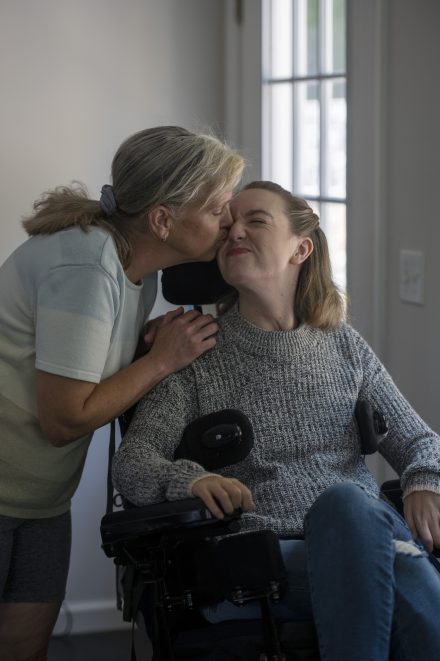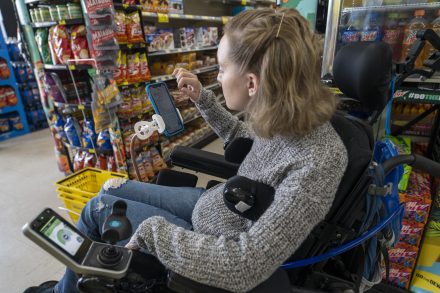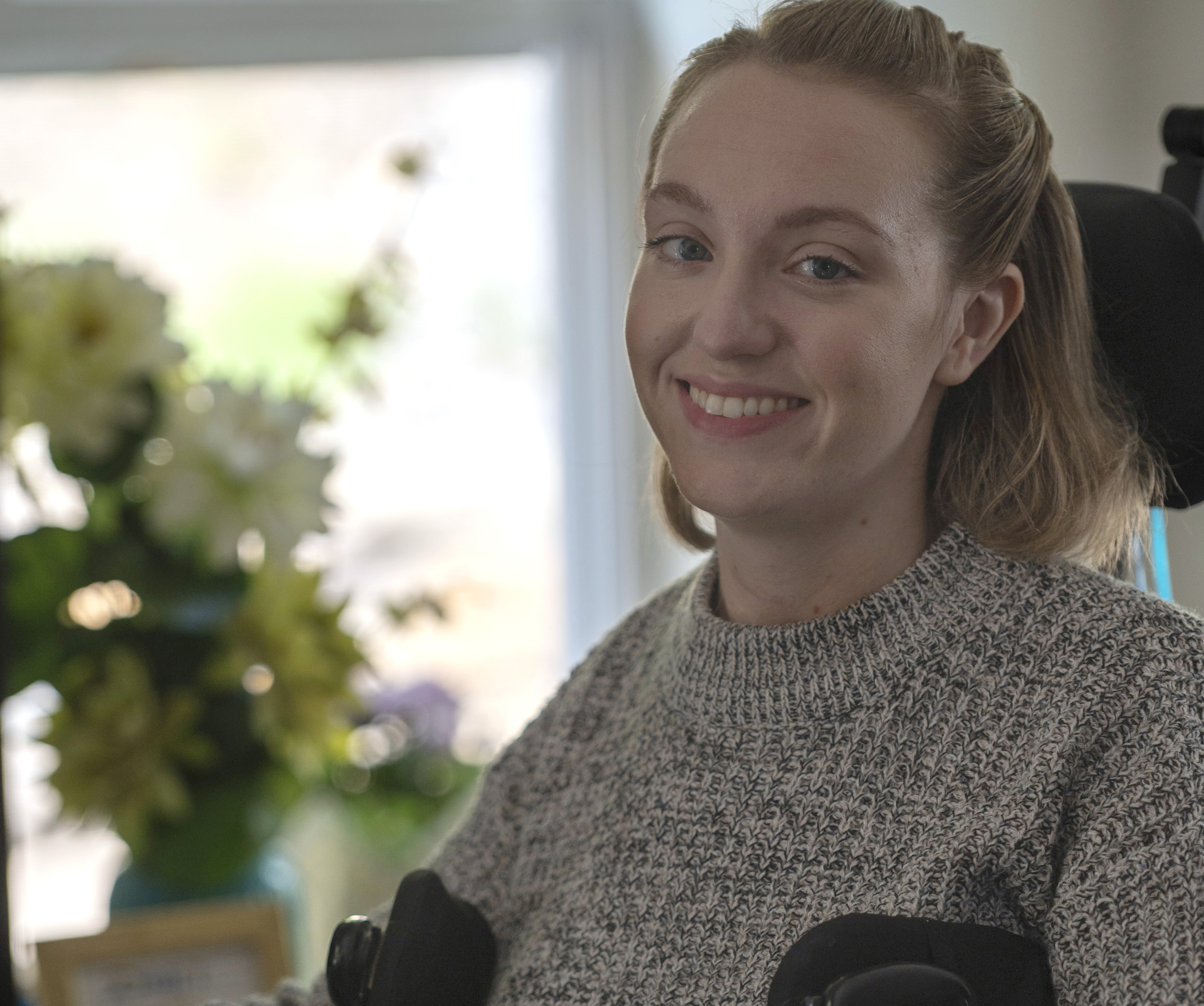Paralyzed after a pool accident, Amy Wert G’17 is advocating for those with physical or intellectual limitations.
Powered by RedCircle
“Everything happens for a reason? I hate that saying.”
It’s an early summer morning, and Amy Wert, a Law graduate from December 2017, is describing over the phone to me her research into America’s mass shootings at an elementary school in Uvalde, Texas, and a Buffalo, New York, grocery store. From what she can tell — admittedly, it hasn’t been an exhaustive review — protocols are almost nonexistent for rescuing individuals with physical handicaps caught in the middle of mass casualty events.
If you don’t know Wert, or haven’t recently been in touch, you might think it’s an unusual area of interest. Most reports of the school shooting have focused on law enforcement failures. At the grocer, it’s the motivation of the gunman.
If you do know Wert, it makes complete sense. This is what happens when a swimming pool accident shatters your C4 and C5 vertebrae, leaving you paralyzed from the chest down with limited arm movement, a motorized wheelchair your lifeline to the outside world.
Her reflection, however, wasn’t in response to the mass shootings. It was about her own journey. “I can be myself without my body to move in, but I wouldn’t be myself if this injury had affected my brain,” Wert says. “The surgeon said to my mom that it was a miracle.”
* * *
Wilkes-Barre, Pennsylvania, is a two-hour drive from New York City. In the shadows of the Pocono Mountains, it’s where Wert excelled in school and, growing up, loved nothing more than Nancy Drew novels and “Law & Order: SVU” episodes. Both inspired her interest in criminal law even before the oldest of three chose to attend Iona University.
Once in college, the mock trial team kept Wert busy between her English and political science courses. Three hours of practice on Tuesdays. Four hours on Saturdays. Monthly competitions. Wert was named a team captain her senior year, which helped prepare her to enter law school the summer following graduation. At Elon University School of Law, Wert continued building trial advocacy skills. She placed second with classmate Brittany Hart in the Intramural Moot Court Competition, joined the Moot Court Board, and completed a residency-in-practice with the Guilford County District Attorney’s Office before graduating in December 2017.
Matthew Groves L’11 served as a mentor for Wert as she studied for the bar exam and clearly remembers what set her apart from others he has helped.
“It was her confidence,” Groves recalls. “She knew what she was doing and where she was going and it was a matter of having someone help keep her from common potholes, both during bar preparation and in her search for a job. From a mentor’s perspective, it is so much easier when somebody knows what they want and isn’t afraid to go get it. All you have to do is point them in the right direction.”
After passing the bar exam in the District of Columbia, Wert worked as a legal content editor for the American Association for Justice, practiced white collar defense for a small Maryland firm, and later assisted with document review for Morgan, Lewis & Bockius LLP in Washington.
Then COVID hit. The firm sent home its staff. Her lease was almost up, and Wert decided to save money by temporarily moving back in with her mother in Wilkes-Barre. Who knew how long the pandemic and remote work might last?
* * *
The accident happened May 8, 2021. Wert was visiting Washington to celebrate a friend’s graduation from a master’s degree program at American University. A group gathered around a hotel pool on an unseasonably warm day. Wert saw no pavement warnings. She didn’t know there was no deep end.

What she’ll never forget is the sound of her head hitting concrete or the sensation of floating face down in just over three feet of water knowing she needed air “but my body wasn’t listening.” A friend turned her over and kept her talking until paramedics arrived. She soon lost consciousness.
Early the next morning, Wert awoke in George Washington University Hospital. “No one ever told me, ‘you’re paralyzed.’ It was still way too early,” she recalls. “What I did know was I couldn’t feel my legs.”
She’d remain in intensive care for nearly a month before transferring to Shepherd Center in Atlanta, one of the nation’s few hospitals specializing in medical treatment for spinal cord and brain injuries. Daily visits to the gym with raised mat platforms helped Wert regain posture and balance. Breathing exercises strengthened her atrophied torso. Occupational therapy taught her how to hold utensils in hands without finger function.
Then there was the wheelchair, which gave Wert her first glimpse into the obstacles faced by those with physical limitations. Several weeks into her stay, Wert ventured outdoors to begin navigating the community with assistive technology. She returned to the hospital sore from the bumps and gaps in the sidewalk.
She moved back home to Wilkes-Barre in September 2021. Doctors told her that for patients who commit to aggressive therapy, progress toward renewed mobility can be made for about two years from the date of injury. Wert still isn’t done with her thrice-a-week therapy regime.
Through it all, from Washington to Atlanta and then back to Wilkes-Barre, Wert’s mother was at her side. “She was there every day, fighting for everything I needed,” Amy Wert says. “If she felt I wasn’t getting help, people would hear about it. The only reason I’m doing as well as I am doing today is because Claire is my mother.”
* * *
Claire Wert has worked in the insurance industry for the better part of three decades. She knows the nuances of filing claims. She’s also familiar with the public benefits that help those like her daughter who live with permanent disabilities. By the time her daughter had transferred to Atlanta for her recovery, Medicaid and Social Security paperwork was already filed.
It didn’t take long for both women to discover the world rarely pays heed to people like Amy. Crosswalks. Sidewalks. Parking spaces. Entries and egresses to public spaces such as grocery stores, restaurants and retailers. In many places, scant attention is paid to accessibility or code enforcement for those who ignore the Americans with Disabilities Act.
Those are just the visible obstacles. Since her injury, Amy also has discovered website accessibility, housing needs and employment options that affect those with limited physical capabilities. The kicker? People with disabilities who need attorneys often are those least able to afford legal services. Medical costs make it hard to marshal the resources for a lawyer.
“If this accident didn’t happen, I truly believe she’d be somewhere taking the world by storm. We just have to figure out how she’s going to do that in this new world.”
Friends from law school who keep in touch with Wert have witnessed the evolution in her career aspirations. “She’s a passionate person and she’s an advocate. She always has been,” says Haley Mendola, Law Class of 2018 and one of Wert’s mentees as a first-year student. “Amy’s tough and she’s not afraid to speak her mind.”
Amy lived with her mother for about a year after returning to Wilkes-Barre from Atlanta. She has since moved into a wheelchair-accessible house that her father had a hand in designing and building. Claire continues to provide Amy with assistance on weekends, and the entire family has been grateful for the outpouring of community support through fundraisers and GoFundMe accounts that bridged their needs in the early months of recovery.
The generosity is part of what will make possible the next chapter of Amy’s life. “I know how independent she is, I know how smart she is and I know her drive,” Claire says. “If this accident didn’t happen, I truly believe she’d be somewhere taking the world by storm. We just have to figure out how she’s going to do that in this new world.”
* * *
Amy Wert today uses social media to connect with others around the United States who face their own unique challenges related to paralysis and traumatic injuries, just as her mother is now active in Facebook groups for caregivers of spine and traumatic brain injury patients. It’s not a large community, but it’s one where both women offer encouragement and wisdom based on their own experiences.
That starts with a simple acknowledgment of someone’s existence and value. “We avert our eyes when we look at disabled people, because it’s easy and it’s not comfortable,” Wert says.

It’s also possible the mother-daughter duo will be future business partners. The National Association for Law Placement, an organization of more than 2,500 legal career professionals, shared in its 2021 Report on Diversity that only 1.22% of all lawyers identify as living with a disability of any kind, placing Wert in rare company as someone who may more easily identify with clients facing obstacles to living independent lives.
Amy and Claire Wert have had more than one conversation about a joint venture, though they have yet to formalize plans. “Between her knowledge of the law, and my knowledge of the insurance industry, and the fight that I had to go through to get her some equipment,” Claire pauses. “And the denials? And the appeals? Regular people, I truly believe, would say ‘OK, the insurance isn’t covering it.’ But you have to fight!”
Hart, Amy Wert’s partner in the Intramural Moot Court Competition, is sure that her classmate will be ready for those fights. “She’s capable of doing whatever she wants,” says Hart, who today practices family law in North Carolina. “If that’s the path she wants to go down, she’ll give it her all, and she’ll find a way to relate to any client.”
Then there’s her advocacy, which happens right from her phone. In Pennsylvania, Wert had a closeup view of the campaign for the U.S. Senate between Democratic Lt. Gov. John Fetterman and Republican Dr. Mehmet Oz. Fetterman was hospitalized in May 2022 following an ischemic stroke, and the question of his health and recovery haunted him through his eventual victory and beyond.
“If I’m stuck in this situation, I’m going to make the most of it.”
Perhaps it shouldn’t have been a surprise, Wert tells me a week after the elections, but what sticks with her were those on Twitter who showed no interest in learning about stroke recovery. To certain partisans and select media personalities, Fetterman was “the ‘r’ word” or “intellectually disabled.” Soon enough, others with disabilities were being dragged through the digital mud. Wert was having none of it.
“I’m going to be honest. Every single time one of those people said something like he was ‘brain damaged’ or ‘mentally handicapped,’ I reported them,” she says. “If you comment on someone based on a disability in a negative way, it’s against Twitter policies. Some of those accounts got blocked.”
Confronting critics on social media. Researching policies and laws that affect those with physical or intellectual limitations. Networking with others in similar situations and sharing legal information for those with limited means. It’s easy to see what might come next for Amy Wert.
Before we end our final call, I cite the very first conversation we had by phone over the summer. Does she stand by her belief that things don’t happen for a reason? “Nothing’s changed about that,” Wert says. “I don’t appreciate it when people say this was meant to happen. It didn’t have to happen. It sucks that it did!
“But if I’m stuck in this situation, I’m going to make the most of it.”



